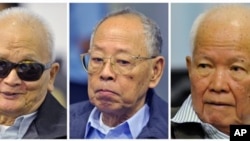As the much criticized U.N.-backed Khmer Rouge tribunal nears its first verdict for senior leaders of the radical regime, its future is in doubt.
Many survivors of the brutal regime have described the tribunal as being too slow, handing down only one verdict since its 2006 inception.
Former Khmer Rouge prison chief Kaing Guek Eav, better known as "Duch," was sentenced to life in prison last year for his role in killing more than 14,000 while running Phnom Penh's Tuol Sleng torture and execution center.
Only two other leaders remain in custody: Nuon Chea, 87, the regime’s ideologue, and Khieu Samphan, 82, its nominal head of state.
A verdict in at least one of the cases could come next month. What happens after their trial is concluded, however, is an open question. Many observers predict the court, which has struggled financially and shouldered criticisms of mismanagement, corruption and political interference, will be dissolved.
Ear Sophal, a Cambodian-American academic and author, tells VOA Khmer the tribunal process has been a disappointment, even in Duch's case.
“I don’t think there was a single Cambodian who probably thought, 'oh, this makes sense, you know, this is a good outcome,'” he said. “Of course, the international community thought this was a good outcome: 'finally, he’s been found guilty; finally he’s going to jail.' But for a lot of Cambodians, this was like rubbing salt in a wound.”
Cambodian-American Sichan Siv, a former U.S. government official, says the tribunal has taken too long and cost too much money.
“For a country as poor as Cambodia, do you want to know how many teachers you could train with that money, how many nurses you can provide and how many hospitals and schools you can build?” he said. “And to spend that much money to bring these people to injustice, in a way, it’s a waste of resources.”
Cambodia’s tribunal has made only five indictments, ultimately trying just three people. By comparison, the Yugoslavian war crimes trials produced 161 indictments, while trials in Rwanda saw 95 and Sierra Leone saw 22.
However, Craig Etcheson, former investigator at the tribunal, said it would have taken a lot of time to investigate the millions of crimes committed by the Khmer Rouge while it was in power.
“One of the key goals of the Khmer Rouge tribunal was to demonstrate to Cambodians in Cambodia how the rule of law works in a proper context,” Etcheson said. “The defendants have many rights, and they exercise all of those rights. This consumes a great deal of time.”
Etcheson said the tribunal was in part an experiment to see whether international justice could be accomplished without great financial cost, explaining that it cost only a fraction of the price of other international tribunals.
“Two-hundred million dollars seems like a lot of money to you and me, but if you think about the two million or more victims of the Pol Pot regime, the $200 million cost of the Khmer Rouge tribunal would add up to investing $100 per person who was killed by the Khmer Rouge,” he said. “And I don’t think $100 per victim is too much to pay for seeking justice.”
As many as 2 million Cambodians died from starvation, overwork and executions during the four-year rule of the Khmer Rouge, which attempted to create an agrarian communist utopia.
The group's leader, Pol Pot, died in 1998 and co-founder Ieng Sary died earlier this year.
This report was produced in collaboration with the VOA Khmer service.




